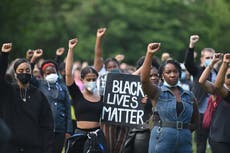‘They don’t value us’ – Labour’s problem with anti-Black racism
An inquiry into racism in the Labour Party has been shelved indefinitely – another blow for its already marginalised Bame community

Your support helps us to tell the story
From reproductive rights to climate change to Big Tech, The Independent is on the ground when the story is developing. Whether it's investigating the financials of Elon Musk's pro-Trump PAC or producing our latest documentary, 'The A Word', which shines a light on the American women fighting for reproductive rights, we know how important it is to parse out the facts from the messaging.
At such a critical moment in US history, we need reporters on the ground. Your donation allows us to keep sending journalists to speak to both sides of the story.
The Independent is trusted by Americans across the entire political spectrum. And unlike many other quality news outlets, we choose not to lock Americans out of our reporting and analysis with paywalls. We believe quality journalism should be available to everyone, paid for by those who can afford it.
Your support makes all the difference.Weeks ago, Black Labour MPs, including shadow cabinet members, wrote in an open letter that they were “disappointed and seriously concerned” with delays to the Forde inquiry.
Headed by Martin Forde QC, the inquiry was set up last May to investigate a leaked internal report containing alleged racist comments about Black MPs by party staffers. Already delayed once, the Forde inquiry has now been shelved indefinitely because of concerns it might prejudice a parallel investigation from the Information Commissioner’s Office (ICO).
The letter from Black MPs including Marsha de Cordova, Diane Abbott, Clive Lewis and Dawn Butler, was addressed to party leader Keir Starmer and warned that failing to publish Forde’s report risked “doubling down on the impression that the party does not take issues of anti-Black racism seriously”.
The report’s delay has tipped many of the party’s already disillusioned Black and ethnic minority members, politicians and staff into despair. And it is not hard to see why. Labour’s leaked internal report showed in black and white the sort of racism that Bame people have habitually experienced and witnessed. (Staffers named in the report say that private messages were edited to create a false impression of racism and sexism and are seeking damages from the party for libel and data misuse.)
The Forde inquiry, with part of its remit to examine the extent of “racist, sexist and other discriminatory culture within Labour party workplaces”, brought the possibility of a long overdue reckoning with racism so often ignored or tiptoed around. Bame people gave evidence to this inquiry, which received more than 1,000 submissions. A report bringing potential for change loomed as a prospect, only to be snatched away. Many wonder why the party cannot find a path to release findings over a wider culture of racism in a way that does not conflict with the ICO’s investigation.
Such findings could not come soon enough. Labour’s Black and Asian MPs, councillors, members and staff alike describe an environment of habitual discrimination and exhaustion with trying to raise the issue within an organisation that seems not to care. Experiences range from racist abuse – both overt and the casual kind that gets dismissed as “banter” – to structural discrimination that stymies inclusion, recognition or promotion.
Look around the party structures and you see a paucity of Bame representation in senior roles: from the shadow cabinet through the leader’s office, party headquarters and local government. Many echo the sentiments described in Shami Chakrabarti’s 2016 report into antisemitism and other racism, of being treated as “good enough to deliver votes and leaflets” but not to reach staff or leadership roles. All told, it’s a bleak Catch-22: discrimination is preventing Bame people from attaining the political capital required to deal with discrimination.
Since Bame people in Labour are so few and feel marginalised, there is anxiety over speaking out. This especially holds for Labour staffers, whose workplace experience seems to be of discrimination and a lack of progression, on insecure contracts in an environment that feels unsafe and is impacting mental health.
A source from Unite, the union representing many Labour staffers, says: “It’s bad. We’ve got a number of grievances mentioning discrimination and feeling alienated. For our [Bame] members it feels like an unwelcoming place.” Retention of Bame staff is especially poor. And of particular concern is Labour’s Community Organising Unit, which has just been shut down – yet with 50 per cent Bame staff, it is the party’s most diverse department. In June last year, Starmer promised an immediate diversity audit of party staff, as part of a bid to boost representation.
Racism in Labour predates Starmer’s leadership and is made worse by the endless factionalism in the party. Factions promote from their own side, propelling their own people into positions of power without realising that prioritisation of the faction over all else keeps the existing structures of discrimination in place. Bame members say they are told that mentioning racism undermines the party leader, whoever he (always a he) is at any given time. Under Starmer, complaints of racism are viewed as attacks from the Labour Left by proxy. Meanwhile, actually tackling racism would entail working across factions, which the party seems physically allergic to.
What makes this more painful is the comparison with Labour’s antisemitism row. When Jewish members and MPs spoke out about experiences of antisemitism, they found allies in the parliamentary party who amplified their concerns and helped ensure media attention. This has not been the experience of Labour’s Black MPs.
Everyone I spoke to for this piece stressed that this is not about downplaying the party’s real problem with antisemitism, or fuelling an oppression Olympics. Some noted that Jewish members are still dealing with prejudice, that antisemitism has obviously not disappeared overnight and that Starmer’s commitment to tackling the issue does not mean that he is doing it well. But the leadership seeming to vocally prioritise one form of racism, while ignoring others, is having a devastating effect. The contrast hurts. Ultimately, no minority benefits from this dynamic, which has a whiff of divide and rule to it.
With Covid disproportionately affecting Bame communities, with the government constantly at war with “woke” causes seeking racial justice and while minorities are dealing with rising race hate incidents, Labour is not standing up for its minority heartlands. Starmer’s tone-deaf response to Black Lives Matter last year, dismissing its political aims as “nonsense”, drove Bame Labour members to leave.
The leadership’s failure to register the diversity of Britain’s working class and it’s nativist-friendly posturing with flags and law and order is compounding the sense of alienation. Now this evident reluctance to tackle party racism has left people feeling demoralised and ignored. “They don’t value us,” one Black councillor told me. “As a community, we are politically lost.”




Join our commenting forum
Join thought-provoking conversations, follow other Independent readers and see their replies
Comments